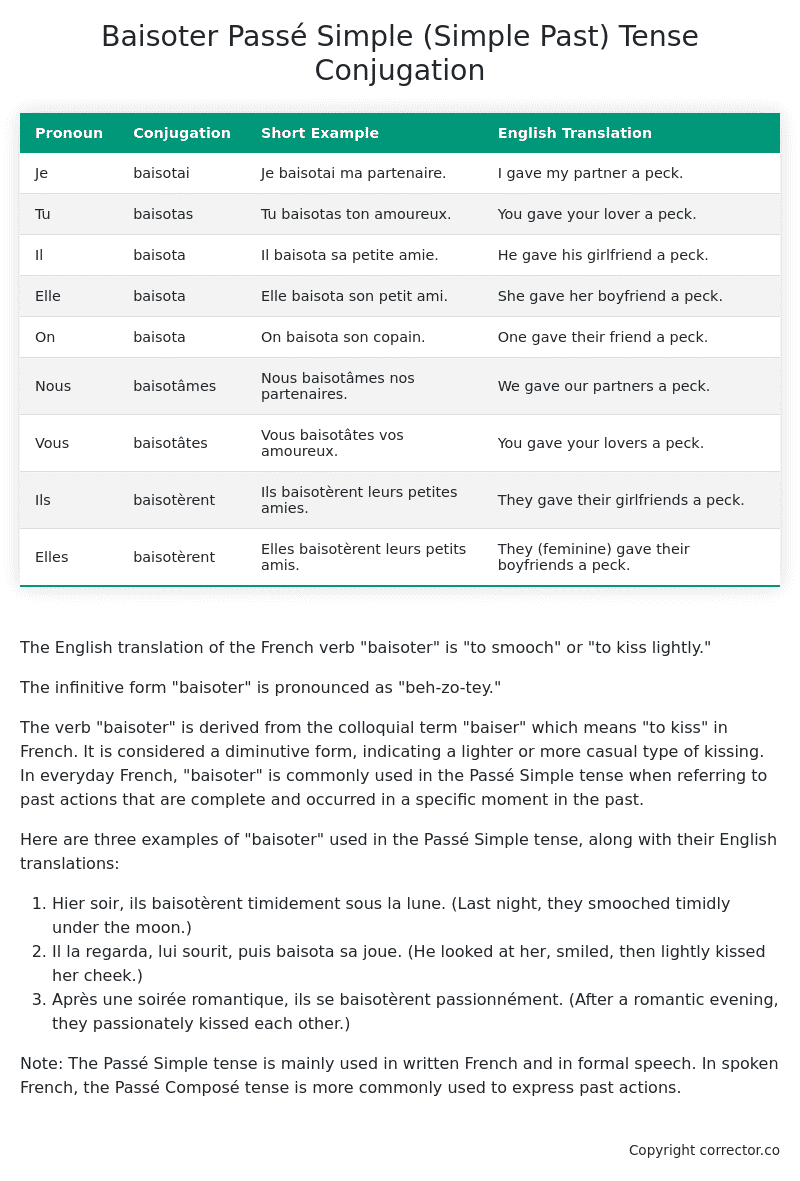Passé Simple (Simple Past) Tense Conjugation of the French Verb baisoter
Introduction to the verb baisoter
The English translation of the French verb “baisoter” is “to smooch” or “to kiss lightly.”
The infinitive form “baisoter” is pronounced as “beh-zo-tey.”
The verb “baisoter” is derived from the colloquial term “baiser” which means “to kiss” in French. It is considered a diminutive form, indicating a lighter or more casual type of kissing. In everyday French, “baisoter” is commonly used in the Passé Simple tense when referring to past actions that are complete and occurred in a specific moment in the past.
Here are three examples of “baisoter” used in the Passé Simple tense, along with their English translations:
- Hier soir, ils baisotèrent timidement sous la lune. (Last night, they smooched timidly under the moon.)
- Il la regarda, lui sourit, puis baisota sa joue. (He looked at her, smiled, then lightly kissed her cheek.)
- Après une soirée romantique, ils se baisotèrent passionnément. (After a romantic evening, they passionately kissed each other.)
Note: The Passé Simple tense is mainly used in written French and in formal speech. In spoken French, the Passé Composé tense is more commonly used to express past actions.
Table of the Passé Simple (Simple Past) Tense Conjugation of baisoter
| Pronoun | Conjugation | Short Example | English Translation |
|---|---|---|---|
| Je | baisotai | Je baisotai ma partenaire. | I gave my partner a peck. |
| Tu | baisotas | Tu baisotas ton amoureux. | You gave your lover a peck. |
| Il | baisota | Il baisota sa petite amie. | He gave his girlfriend a peck. |
| Elle | baisota | Elle baisota son petit ami. | She gave her boyfriend a peck. |
| On | baisota | On baisota son copain. | One gave their friend a peck. |
| Nous | baisotâmes | Nous baisotâmes nos partenaires. | We gave our partners a peck. |
| Vous | baisotâtes | Vous baisotâtes vos amoureux. | You gave your lovers a peck. |
| Ils | baisotèrent | Ils baisotèrent leurs petites amies. | They gave their girlfriends a peck. |
| Elles | baisotèrent | Elles baisotèrent leurs petits amis. | They (feminine) gave their boyfriends a peck. |
Other Conjugations for Baisoter.
Le Present (Present Tense) Conjugation of the French Verb baisoter
Imparfait (Imperfect) Tense Conjugation of the French Verb baisoter
Passé Simple (Simple Past) Tense Conjugation of the French Verb baisoter (You’re reading it right now!)
Passé Composé (Present Perfect) Tense Conjugation of the French Verb baisoter
Futur Simple (Simple Future) Tense Conjugation of the French Verb baisoter
Futur Proche (Near Future) Tense Conjugation of the French Verb baisoter
Plus-que-parfait (Pluperfect) Tense Conjugation of the French Verb baisoter
Passé Antérieur (Past Anterior) Tense Conjugation of the French Verb baisoter
Futur Antérieur (Future Anterior) Tense Conjugation of the French Verb baisoter
Subjonctif Présent (Subjunctive Present) Tense Conjugation of the French Verb baisoter
Subjonctif Passé (Subjunctive Past) Tense Conjugation of the French Verb baisoter
Subjonctif Imparfait (Subjunctive Imperfect) Tense Conjugation of the French Verb baisoter
Subjonctif Plus-que-parfait (Subjunctive Pluperfect) Tense Conjugation of the French Verb baisoter
Conditionnel Présent (Conditional Present) Tense Conjugation of the French Verb baisoter
Conditionnel Passé (Conditional Past) Tense Conjugation of the French Verb baisoter
Conditionnel Passé II (Conditional Past II) Tense Conjugation of the French Verb baisoter
L’impératif Présent (Imperative Present) Tense Conjugation of the French Verb baisoter
L’impératif Passé (Imperative Past) Tense Conjugation of the French Verb baisoter
L’infinitif Présent (Infinitive Present) Tense Conjugation of the French Verb baisoter
L’infinitif Passé (Infinitive Past) Tense Conjugation of the French Verb baisoter
Le Participe Présent (Present Participle) Tense Conjugation of the French Verb baisoter
Le Participe Passé (Past Participle) Tense Conjugation of the French Verb baisoter
Struggling with French verbs or the language in general? Why not use our free French Grammar Checker – no registration required!
Get a FREE Download Study Sheet of this Conjugation 🔥
Simply right click the image below, click “save image” and get your free reference for the baisoter Passé Simple tense conjugation!

Baisoter – About the French Passé Simple (Simple Past) Tense
Formation
Usage
Narration
Historical Context
Interactions with other tenses
Passé Composé
Imparfait
Conditional and Subjunctive
Summary
I hope you enjoyed this article on the verb baisoter. Still in a learning mood? Check out another TOTALLY random French verb conjugation!


